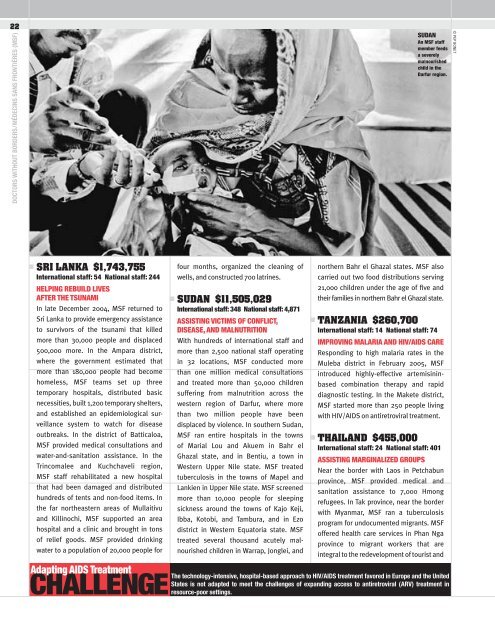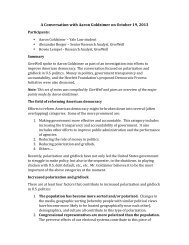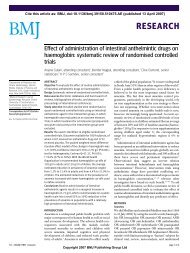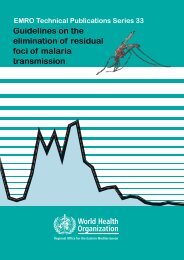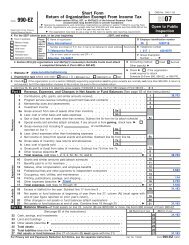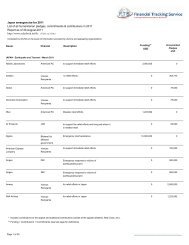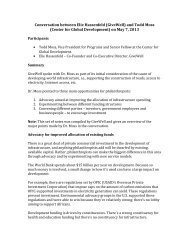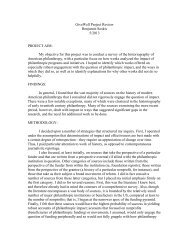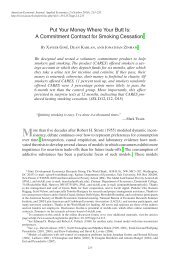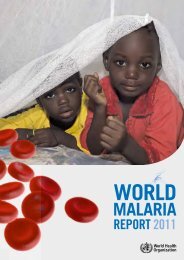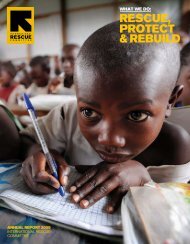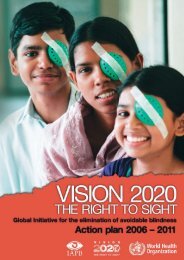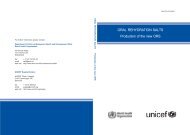Annual Report 2005 - Doctors Without Borders
Annual Report 2005 - Doctors Without Borders
Annual Report 2005 - Doctors Without Borders
Create successful ePaper yourself
Turn your PDF publications into a flip-book with our unique Google optimized e-Paper software.
22<strong>Doctors</strong> <strong>Without</strong> borders/MÉdecins sans frontiÈres (MSF)SudanAn MSF staffmember feedsa severelymalnourishedchild in theDarfur region.© Pep BonetSRI LANKA $1,743,755International staff: 54 National staff: 244Helping rebuild livesafter the tsunamiIn late December 2004, MSF returned toSri Lanka to provide emergency assistanceto survivors of the tsunami that killedmore than 30,000 people and displaced500,000 more. In the Ampara district,where the government estimated thatmore than 180,000 people had becomehomeless, MSF teams set up threetemporary hospitals, distributed basicnecessities, built 1,200 temporary shelters,and established an epidemiological surveillancesystem to watch for diseaseoutbreaks. In the district of Batticaloa,MSF provided medical consultations andwater-and-sanitation assistance. In theTrincomalee and Kuchchaveli region,MSF staff rehabilitated a new hospitalthat had been damaged and distributedhundreds of tents and non-food items. Inthe far northeastern areas of Mullaitivuand Killinochi, MSF supported an areahospital and a clinic and brought in tonsof relief goods. MSF provided drinkingwater to a population of 20,000 people forfour months, organized the cleaning ofwells, and constructed 700 latrines.SUDAN $11,505,029International staff: 348 National staff: 4,871Assisting victims of conflict,disease, and malnutritionWith hundreds of international staff andmore than 2,500 national staff operatingin 32 locations, MSF conducted morethan one million medical consultationsand treated more than 50,000 childrensuffering from malnutrition across thewestern region of Darfur, where morethan two million people have beendisplaced by violence. In southern Sudan,MSF ran entire hospitals in the townsof Marial Lou and Akuem in Bahr elGhazal state, and in Bentiu, a town inWestern Upper Nile state. MSF treatedtuberculosis in the towns of Mapel andLankien in Upper Nile state. MSF screenedmore than 10,000 people for sleepingsickness around the towns of Kajo Keji,Ibba, Kotobi, and Tambura, and in Ezodistrict in Western Equatoria state. MSFtreated several thousand acutely malnourishedchildren in Warrap, Jonglei, andnorthern Bahr el Ghazal states. MSF alsocarried out two food distributions serving21,000 children under the age of five andtheir families in northern Bahr el Ghazal state.TANZANIA $260,700International staff: 14 National staff: 74Improving malaria and HIV/AIDS careResponding to high malaria rates in theMuleba district in February <strong>2005</strong>, MSFintroduced highly-effective artemisininbasedcombination therapy and rapiddiagnostic testing. In the Makete district,MSF started more than 250 people livingwith HIV/AIDS on antiretroviral treatment.THAILAND $455,000International staff: 24 National staff: 401Assisting marginalized groupsNear the border with Laos in Petchabunprovince, MSF provided medical andsanitation assistance to 7,000 Hmongrefugees. In Tak province, near the borderwith Myanmar, MSF ran a tuberculosisprogram for undocumented migrants. MSFoffered health care services in Phan Ngaprovince to migrant workers that areintegral to the redevelopment of tourist andAdapting AIDS TreatmentThe technology-intensive, hospital-based approach to HIV/AIDS treatment favored in Europe and the UnitedStates is not adapted to meet the challenges of expanding access to antiretroviral (ARV) treatment inchallengeresource-poor settings.


